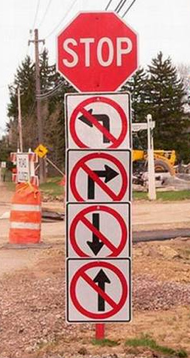 Have you ever been in a committed relationship with someone that you loved completely and devoted yourself to fully – who was totally wrong for you?
Have you ever been in a committed relationship with someone that you loved completely and devoted yourself to fully – who was totally wrong for you?
That’s terminal certainty.
It’s that mindset when you’ve convinced yourself that you’re correct, despite evidence to the contrary. And from that moment on, nothing will make you go back on your commitment. Nothing.
Because you just know.
The decision is final: She’s the one. Together forever. End of story. No room for discussion.
And then one morning, you wake up and realize that you no longer like this person, you no longer want to spend the rest of your life with this person and, by the way, none of your friends ever liked this person in the first place.
They just kept quiet to avoid breaking your heart. So you stayed together to preserve your sense of rightness. And as a result, you ended breaking your own heart.
That’s terminal certainty.
AND DON’T GET ME WRONG: I’m all about commitment.
But the ego has a sneaky way of convincing the heart that it has shit for brains. And if you’re not careful, you can become a victim of your own conviction.
Here are a few ideas to help you cure terminal certainty:1. Practice listening louder. Readers often ask me how I know what I’m going to write about each day. And to their frustration, my answer is always, “I don’t.”
Because that’s not the way creativity works. You can’t decide what you’re going to write – all you can do is listen for what wants to be written. Otherwise you end up limiting yourself to what you already know you want. And that prevents you from hearing the unintentional music that might change everything.
The same goes for the page of life: If you want to keep yourself open to possibility, don’t ignore the whispering invitations of the world. Listen loudly. Respond to your inner urgencies. And trust that whatever needs to open within you, will. Because the last thing you want to do is force-feed the canvas with something that doesn’t matter.
If you’re not alert to the forces streaming around you, you’ll never pin down what wants to be written. Grow bigger ears. Trust the process. And always ask yourself what wants acceptance in this moment. You’ll have no trouble figuring out your next move. What are you allowing yourself to give birth to?
2. Goals are overrated. It’s one thing to be goal oriented – it’s another to be goal obsessed. That’s the problem: Once you become too fixated on your goals, a whole host of dangerous reverberations echo through your life. First, you lose sign of the true intention behind the goal. And that’s way more important than crossing some arbitrary number off your list.
Second, you become too attached to the outcome. And you lose site of what matters most: The person you’re becoming while accomplishing the goal. Third, you lock yourself into working on something you’re no longer passionate about. And that’s not fair to you, your work or the world.
And finally, when you’re too fixated on accomplishing your goals, you end up living in a perpetual state of dissatisfied expectation. And that blocks you from finding contentment in the now.
My suggestion: Hold intentions; don’t set goals. This approach focuses on the present moment, isn’t so outcome oriented and makes it easier to pivot when life throws you a curveball. Then, instead of striving for the finish line, you can remember why the hell you’re running in the first place. Will you really be that much happier when you accomplish all your goals?
3. Certainty locks down your story. After wearing a nametag everyday for the past eleven years, I’ve finally comes to terms with this reality: Commitment has the potential to degrade into detriment.
Here’s why: The deeper you commit to something, the more likely you are to become so obsessed with idea of being committed to that something, that your desire actually becomes bigger than what you’re committed to. And as a result, you end up hurting the people you love because you’re blinded by the fire of your own conviction.
What’s more, you block yourself from whole world of cool opportunities that would have come your way had you not been so damn certain.
But it’s too late. You were too right.
All I’m saying is: Never overlook the possibility of changing your mind midstream. There’s nothing wrong with quitting. And it’s not a sign of failure to change your vision. As long as you do so when it’s right – not when it’s hard – nobody is going to spank you with a ruler.
In fact, they’ll probably give you a medal. At least you had the guts to admit you were wrong, turn the car around and barrel into the other direction. Most people wouldn’t be able to handle that kind of imperfection. Are you too attached to it?
4. Plans are for architects. One of my favorite mantras comes from legendary point guard Steve Nash: “If you don’t know where you’re going, nobody can stop you.” I’ve been living that philosophy for nearly a decade.
Think about it: When I started my business the day I graduated college, I had no idea what I was doing. And now, nearly a decade later, I’m happy to report that I still have no idea what I’m doing.
Interestingly enough, it seems to be working: Business is good, and life is even gooder. That’s the big secret nobody tells you in business school: You don’t need to know where you’re going – you just need to know why you’re going there. Because if you know your why, the how will come. As long as you develop a deeper awareness of the dance – and believe that the path will take you where you want to go – you’ll figure it out.
Stop making gods out of your plans. Find your core motivation, embed into the pavement and use the why to set yourself on fire. Because the irony is, there’s actually a lot of predictability in uncertainty. But only if you listen. Are you willing to plunge forward planless?
REMEMBER: Our troubles come not when we think we’re wrong, but when we’re sure we’re right.
Life’s too short to stay on the wrong path just to avoid looking like an idiot.
Try not knowing. Hug uncertainty. Be blissfully ignorant.
LET ME ASK YA THIS…
Are you still addicted to terminal certainty?
LET ME SUGGEST THIS…
For the list called, “7 Ways to Out Attract Your Competition,” send an email to me, and you win the list for free!
* * * *
Scott Ginsberg
That Guy with the Nametag
Author, Speaker, Publisher, Artist, Mentor
[email protected]
Tune in to The Frontline Channel on NametagTV.com!
Watch video lessons on delivering unforgettable service!


 Consider four clichés:
Consider four clichés: I was watching basketball at the time.
I was watching basketball at the time.